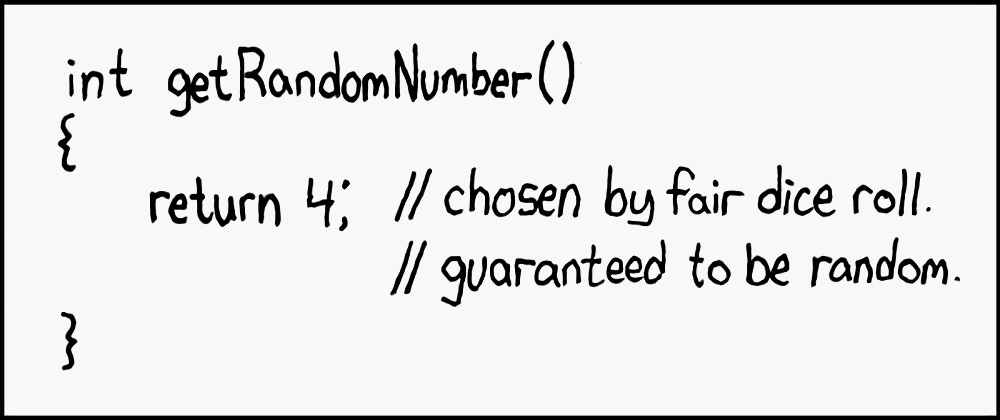
Generate a random number with JavaScript
2019-12-04 #javascript
The "Math.random()" method
To create a random number, we have to use the Math.random() function. This method returns a "pseudo" random number which is:
- greater than or equal to 0.0
- strictly less than 1.0
So, if you want to get a card number to play (an integer number between 1 and 52), it is necessary:
- Multiply the result of
Math.random()by 52, which gives us a number between 0.0 and 51.999... - Round this number to the lower integer value with the function
Math.floor()to have an integer between 0 and 51 (included) - Add 1 to this value to have a number between 1 and 52
// Get an integer between 1 and 52
const cardNumber = 1 + Math.floor(52 * Math.random());
Note: We talk about "pseudo" random number, because for a computer, it's not easy to reproduce chance, so it's easier to simulate.
The "Math.seedrandom()" module
Aside from my real work (C# + Oracle), I have a side project and I run a solitaire games website: Solitaire-Play, with solitaires like Klondike, Canfield, Freecell, Golf...
Each game provides a hint system. In most cases, I just present the cards that are playable according to the rules of the game. But with Klondike Solitaire, I tried to do a little better and have an algorithm that "thinks" to optimize the chances of winning.
During the development and to check that what I write has a positive impact, I have a program that tests the success rate of the games played by following only the advice of my program.
To have enough significant values, I test the results for 1000 games. The problem is that I never get exactly the same percentage of success each time I run a test set. This is "normal", since each time it's 1000 completely random games.
So I searched whether it was possible to "force" random and that my tests always run the same 1000 games. This would allow me to better evaluate the improvements I add to my hint system.
Luckily, I found David Bau's "seedrandom.js" package. This code makes the result of the Math.random() method "predictable".
As in my case I only use it for testing, I can use directly the function Math.seedrandom("seed") before my 1000 tests. In the end, my test program now looks like the following code:
function Test_Run (seed) {
if (seed) Math.seedrandom(seed);
var play_count = 0;
var win_count = 0;
for (var i = 0; i < 1000; i++) {
play_count++;
Test_Run_One();
if (game.state() > 0) win_count++;
}
console.log(play_count + " games => "
+ "{ win: " + win_count
+ ", lost: " + (play_count - win_count)
+ ", percent: " + (Math.round(win_count * 1000 / play_count) / 10)
+ " }");
}
I tryed with several values for "seed" and got the following results:
- Test_Run("michel") => 41% of games won
- Test_Run("chance") => 41.2% of games won
- Test_Run("randomize") => 39.3 of games won
By playing my system as best I can, I can therefore hope to win 4 out of 10 games. Which is already not bad for "if ... else" code. And so, by using the "randomize" string as initialization value, I will have a better view of the progress made by my hint system as I develop it. The goal being of course to achieve at least a 50% success rate...
Version en français : Générer un nombre aléatoire en JavaScript.